Table of Contents
A nutritious diet during pregnancy is the best thing you can do for yourself and your baby. Moreover, a balanced diet has enough macro and micronutrients to help the baby’s healthy development.
But, many cravings and food aversions in pregnancy may not let you have a balanced diet. But, gradually, you can explore many food options. You can do this by assessing your diet, and it’s never too late to start healthy eating.
To help you, here are some tips on healthy diets during pregnancy and much more.
Calorie requirements for pregnancy
The importance of nutritious foods in pregnancy is more than ever. You need to support your body and growing baby for a healthy pregnancy.
According to Studies, pregnant women should have adequate nutrition to avoid complications and life-long side effects (1). Also, there is an increase of approximately 300 kcal/day for pregnant women (2).
To be more accurate, the calorie requirement can be:
- First trimester (first 12 weeks) — no additional calories
- Second trimester (13 to 26 weeks) — nearly 340 extra calories a day
- Last trimester (after 26 weeks) — approximately 450 extra calories a day
Weight gain is normal in pregnancy; you may notice a significant increase in the second and third trimesters (3, 4). But, in the first trimester, there is nausea which may reduce your calorie intake and lead to losing weight (5).
But, maintaining a healthy weight is very important in pregnancy (3). You must consult your doctor for calorie requirements, diet, etc. As all pregnancies are unique, there are several factors, like weight before pregnancy, age, genetics, and health problems. So, consult the experts for the best advice.
Bonus Tips
There are better approaches than counting calories and fulfilling your daily requirements. Instead, your calories should come from nutrition-dense foods. To adopt this strategy, you can have healthy snacks, less processed food, and lots of green leafy vegetables and fruits.
A balanced and healthy diet when pregnant
A balanced and healthy diet is important for everyone out there. But, it becomes even more important if you are pregnant (6). These 280-day or 40-week journeys witness hormonal changes, weight gain, mood swings, and many other processes (7).
The development of the baby, preparing the body for birth, lactation, etc., means you need to provide your body with the most nutritious diet (8). All this will support the body and growing baby at every level.
Here are some tips for you to welcome a good diet into your routine:
Pregnancy food chart
Here is a pregnancy food chart to fulfill your nutrient needs:
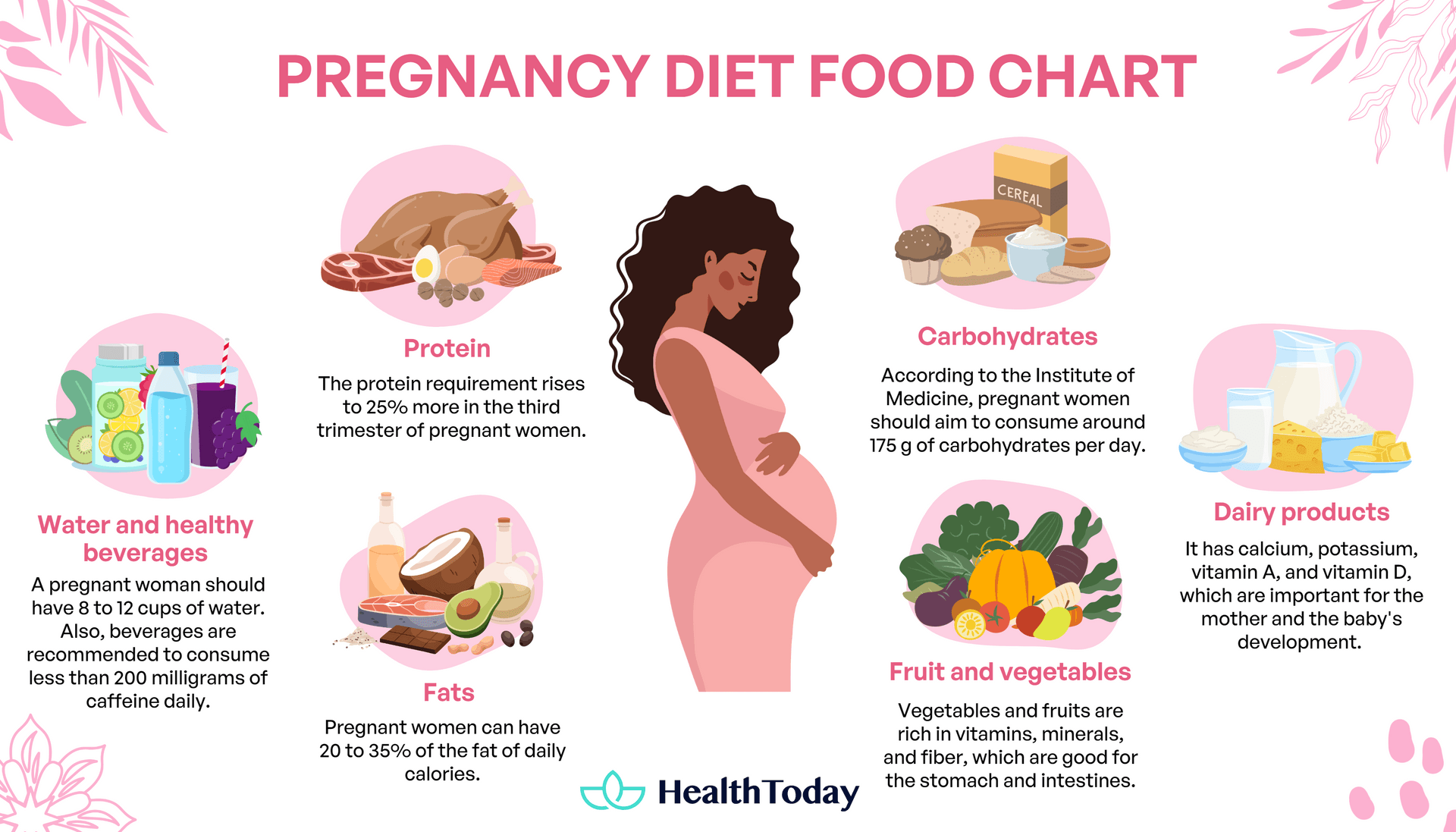
Here are some basic principles of a healthy pregnancy diet (8):
- Add healthy whole fruits, grains, vegetables, lean protein, low-fat foods, and healthy oils to your diet.
- Take additional prenatal supplements like folic acid, iron, choline, etc., as recommended by your healthcare provider.
- Avoid alcohol, caffeine, processed food, and lots of sugars.
The best foods for pregnancy include lots of fresh and nutritious sources. For example, berries, oranges, apples, mangoes, broccoli, okra, spinach, peppers, and jicama. Also, grains like brown rice, millet, oatmeal, and bulgur are great. For oil, use olive oil, avocado, nuts oil, etc.
Note: The tip is to add all essential nutrients to your diet (9). But, you must discuss your diet with the doctor as each pregnancy has different factors and requirements.
Protein During Pregnancy
Protein-rich foods are essential for the growth of muscles and tissues. It helps the mother feel full and helps in the baby’s development (10). The protein requirement rises to 25% more in the third trimester of pregnant women (11).
To meet your requirements, you can consume 79g of protein daily during early gestation and 108g during late gestation (12). Some of the best sources of protein are:
- Non-veg sources – Lean protein from lean meats, seafood, lean beef, pork, fish
- Eggs
- Dairy- Milk, cheese, and other dairy foods
- Beans and peas
- Nuts and Seeds
- Soy products like tempeh and tofu
Carbohydrates
Carbohydrates are an important energy source and support many functions in pregnant women and babies. The trick is to source it from healthy options. For example, you should include complex carbohydrates that contain fiber, vitamins, and minerals necessary for the body.
According to the Institute of Medicine (13), pregnant women should aim to consume around 175 g of carbohydrates per day. It’s important to stay within this limit and choose healthy options, as consuming too many carbohydrates can increase the risk of gestational diabetes.
Some of the healthy sources of carbs are:
- Whole grains – quinoa, buckwheat, and whole-wheat pasta
- Fiber-rich vegetables – broccoli, leafy greens, and carrots.
- Starchy vegetables – sweet potatoes, pumpkin
- All the beans and lentils
- Fiber-rich fruits – apples, berries, and bananas
Fats
A healthy fat percentage is necessary for a baby’s organs and the placenta. But its sources should be from healthy fats like vegetable fats etc. For example, you should avoid fats from butter, heavy cream, cookies, pastries, and high-fat meats.
Pregnant women can have 20 to 35% of fat of daily calories (14). Some of the healthy sources of fats are:
- Fatty fish
- Avocado
- Whole egg
- Nuts and Seeds
- Dark chocolate
- Olive, canola, and soybean oil
Fruit and vegetables
Having enough fruits and vegetables during pregnancy is very important (15). Vegetables and fruits are rich in vitamins, minerals, and fiber, which are good for the stomach and intestines. Therefore, it helps you fulfill nutritional requirements and avoids constipation (16, 17).
The leafy green and fresh fruits must have five portions of a variety daily. You can alter the fruits and vegetables daily to enjoy every type.
Some of the best options are:
- Vegetables – cucumber, mushrooms, seaweed, kale, spinach, cooked green vegetables, tomatoes, and red sweet peppers.
- Fruits – apple, banana, cantaloupe, honeydew, mangoes, prunes, bananas, apricots, oranges, and red or pink grapefruit (for potassium)
You can also try calcium-fortified orange juice or simple orange juice in moderation (18).
Dairy products
Dairy products sourced from healthy options are essential for pregnancy nutrition. For example, they have calcium, which is important for developing a baby’s bones. Also, it has potassium, vitamin A, and vitamin D, which are important for the mother and the baby’s development (19, 20).
Make healthy food choices during pregnancy, opting for fat-free or low-fat yogurt, skim or 1% milk, and unsweetened dairy products. Avoid certain types of cheese, such as unpasteurized cheeses. Be aware of the sodium content in cheese and choose lower sodium options, such as fresh mozzarella and ricotta cheese.
Water and healthy beverages
You must be wondering how much water should a pregnant woman have. Well, a pregnant woman should have 8 to 12 cups (64 to 96 ounces) of water (21). A hydrated body helps to have healthy digestion and may help form amniotic fluid around the baby.
Regarding beverages, you can have smoothies, juices, and other fruit and vegetable beverages. However, you must check the content of caffeinated drinks as it’s suggested to have less than 200 milligrams of caffeine daily (22).
A lot of caffeine can affect the baby and your health. So, choose decaf or have these drinks in smaller amounts. Also, you can try teas safe for pregnancy, like herbal tea, which has no caffeine. Remember to check the ingredients and consult your doctor before trying herbal teas.
Bonus tips
Your diet should have all the macro and micronutrients in various fruits, vegetables, dairy, meats, beverages, etc. You can create a customized diet plan with the help of doctors.
Pregnancy nutrition: Essential vitamins & minerals
Here are some of the most important essential vitamins and minerals for healthy pregnancy:
Folate and folic acid
Folate, known as vitamin B, is one of the most crucial prenatal vitamins (23). It is found in supplements and fortified foods in the form of folates.
It’s important as it prevents neural tube defects and deformities of the brain and spinal cord of the baby.
You need 600 to 1,000 micrograms(µg) of folate or folic acid daily for a healthy pregnancy. Some of its sources are dark green leafy vegetables, citrus fruits, beans, lentils, etc (24).
Calcium
A good amount of calcium supports the baby’s bones, heart, muscular, and nervous systems (25). Also, it’s important for expecting mothers. Many calcium sources can also be taken as supplements.
You may need 1,200 milligrams (mg) a day during pregnancy (26). Some of its sources are milk, eggs, breakfast cereals, kale, broccoli, etc.
Vitamin D
Vitamin D is the primary factor that influences the absorption of calcium from the gut and is essential for developing a baby’s bones and teeth (27). As an expecting mother, you may need 600 international units (I.U.) daily.
Some of its sources are fortified milk, fortified foods, fatty fish like salmon, etc.
Iron
Iron is one of the most vital minerals for expecting women (28). It is required in double quantities because iron makes hemoglobin in the body. The hemoglobin found in red blood cells carries oxygen to the developing baby (29).
Therefore, you must have iron supplements or iron-rich foods.
The suggested value of iron daily is 27 milligrams a day. Some of its good sources are lean red meat, poultry, fish, iron-fortified breakfast cereals, beans, and vegetables. When consuming plant-based iron-rich foods, it is important to combine them with high-vitamin C fruits to improve absorption (30).
Iodine
Iodine is important for a baby’s brain and nerve growth and to avoid neural tube defects (31, 32). The required amount is 250 micrograms(μg) per day. Its best sources are table salt (commonly fortified with iodine), yogurt, milk, shrimp, eggs, tuna, etc.
DHA
Docosahexaenoic acid (DHA) is an omega-3 fatty acid essential for the baby’s visual and mental development (33). It also avoids neural tube defects.
Its recommended value is 200 to 300 mg per day. You can add it to your diet from salmon, tuna, fortified eggs, sardines, etc.
Apart from these, your diet or supplements must have choline, copper, magnesium, manganese, zinc, omega 3 and 6 fatty acids, Vitamin B1, B2, B3, B4, B5, B6, B7, B12, phosphorus, Vitamin C, K, D, E, etc (34).
Bonus Tips
The tip to add these important elements to the diet is to have nutritious dense food. However, you must conduct some tests to know if you are not lacking something. Also, having high-quality supplements is advisable during pregnancy.
Food aversions and cravings during pregnancy
There can be food aversions in pregnancy due to hormonal changes (35, 36). Especially, it happens in the first trimester, which includes nausea, morning sickness, and less appetite.
Tips for dealing with food aversions
Here are some tips for dealing with food aversions:
- Have small portions of food
- Focus on the food you love eating and make it healthy.
- Stay physically active
- Have citrus fruits with vitamin C.
Healthy snack ideas for pregnancy cravings
As an expecting mother, you may feel the need to munch something. Don’t hold that feeling, and make healthy snacks with good ingredients. Here are some delicious and healthy snack ideas:
- Try avocado toast or smoothies.
- You can try vegetable and bean soups.
- Try pasta made from complex carbs, or zucchini pasta
- Try fresh fruit smoothies.
- You can enjoy lower-sugar fruit yogurt.
- Try hummus with wholemeal pitta bread.
- Orange juice is loaded with vitamin C.
- Try steamed corn, broccoli, and carrots, and sprinkle them with fresh seasonings.
Food safety during pregnancy
Sometimes some food ingredients can be harmful to the mother and baby. It has elements that are not pregnancy-safe. Also, it may have something more than the required amount.
To know more, here are some food safety tips during pregnancy:
Foods to Avoid During Pregnancy
Here are some foods to avoid during pregnancy:
- Food made from unpasteurized milk and from unknown sources, with special attention to soft cheese like feta, queso, blanco, etc..
- Raw and undercooked food. Especially seafood, eggs, meats, etc.
- You should avoid fish having high mercury content (37).
- Refrigerated meat spread and smoked seafood.
- The food which is high in caffeine content.
- Limit alcohol and smoking.
Tips for handling and preparing food safely
The safe preparation and handling of food is very important in pregnancy. You must have contamination-free food to avoid unwanted complications (38). Here are some tips for dealing with it:
- You must thoroughly wash all your fruits, vegetables, and meats.
- Always wash your hands before cooking and having meals.
- Cook the meals properly.
More expert tips on a pregnancy diet
Here are some common queries and answers to them:
Eating double for two?
No, you don’t have to eat for two. It’s a common myth that leads to excessive weight gain. Instead, your diet should be nutritious and as per your appetite.
Not gaining enough weight or gaining as much as you want is fine?
Both gaining no weight and gaining too much are not healthy. Your weight gain must be gradual and healthy. Generally, women gain weight around the second or third trimester. So, consult your doctor for expert advice.
Healthy women won’t feel discomfort.
No, pregnancy comes with its discomforts. But you may avoid complications if you eat nutrient-dense food, drink water, maintain an appropriate level of exercise, and stay active. Also, every pregnancy is unique, so you must consider your factors.
Drinking some wine occasionally is fine.
No, drinking wine is not recommended. The developing baby can’t process alcohol, and can have some side effects. So, avoid alcohol during pregnancy in any form.
Summary
Pregnancy is a beautiful journey that welcomes so many changes in your body. Well, you should embrace the feelings as they change. The tips are to stay happy and active and have a balanced diet. Also, be around your loved ones.
You should fulfill all the macro and micronutrients to support the baby’s healthy development. Then, after the doctor’s advice, you can choose a nutritious diet or add some supplements. Also, regular checkups and staying busy will help greatly, so enjoy this magical journey.
Go through all the tips mentioned above and have a happy pregnancy.





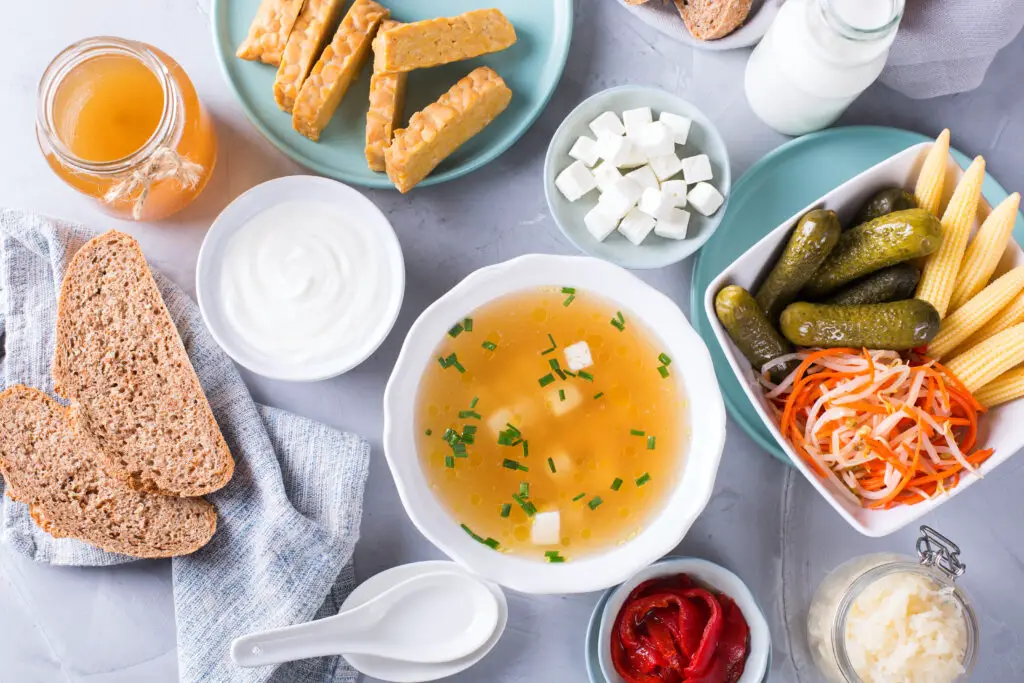
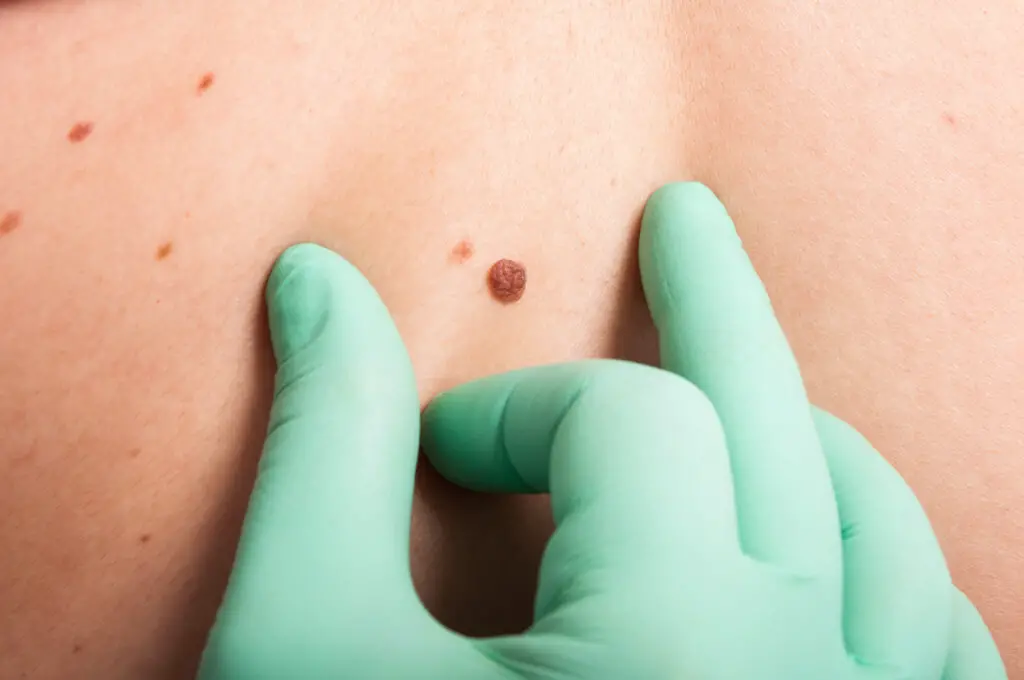

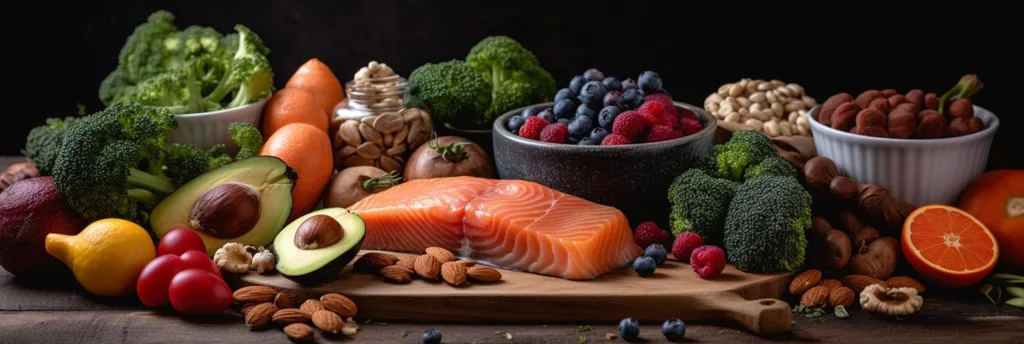



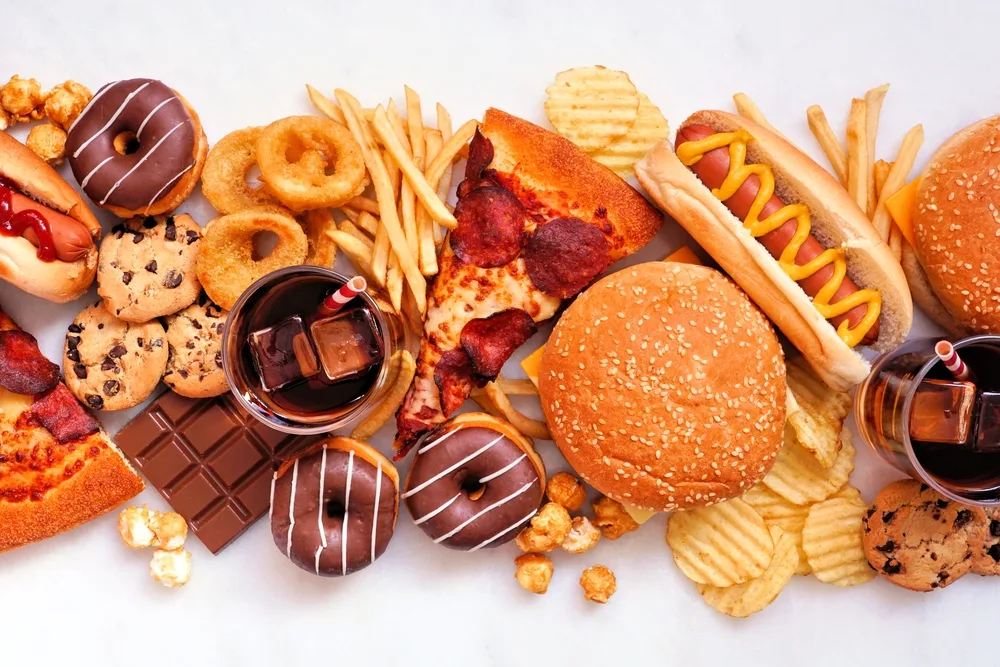
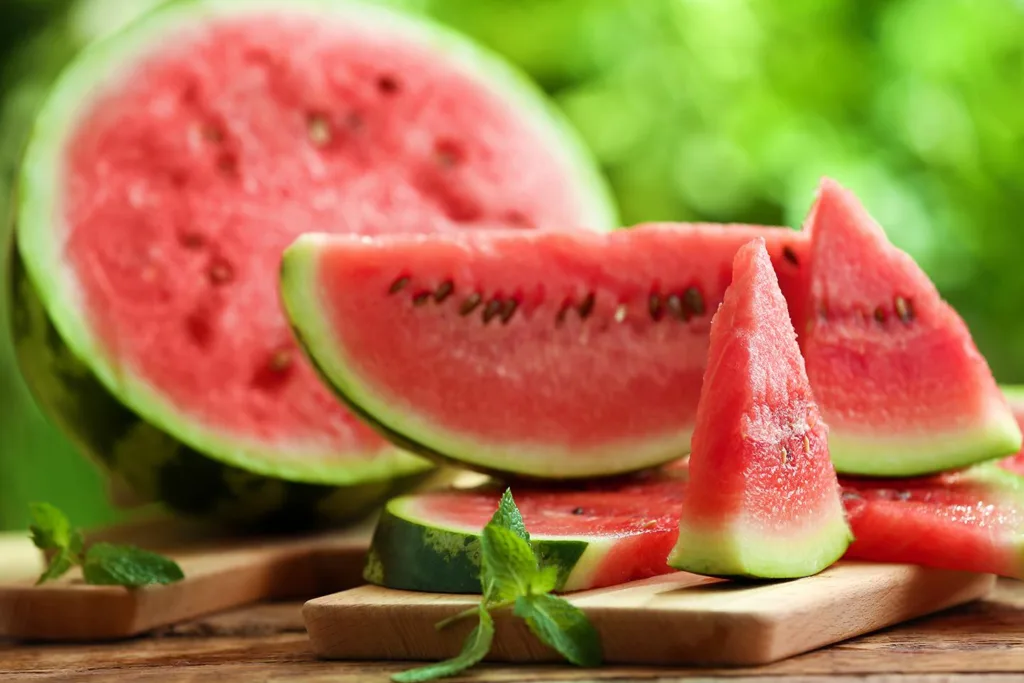



Comments
0